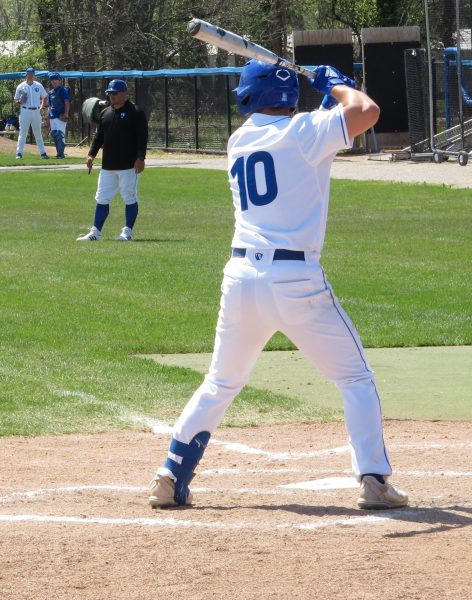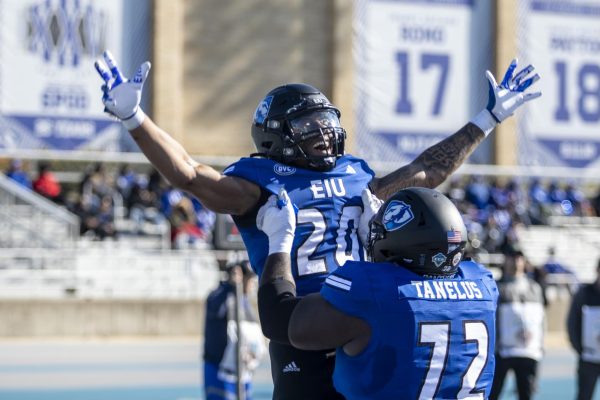Spoo perseveres through struggles
His career was on the line.
A letter that landed on head coach Bob Spoo’s desk said Eastern would fire him if he did not win at least six games of the 1994 season.
Spoo was not surprised.
Eastern had finished under .500 for four straight seasons.
During that stretch, their overall record was 17-26-1.
But no matter how bad it became, Spoo never made any excuses or blamed his coaches.
“He is one of the guys in the profession that doesn’t have any ego at all,” said Roy Wittke. “He was able to adapt. We all respected that about him.”
Wittke coached with Spoo at Eastern for 13 years up to 2002 and is now Arizona State’s offensive coordinator.
Spoo is expected to miss four to six weeks while he recovers from surgery performed Tuesday. When he returns, it will be his 20th season as the head coach of Eastern’s football team.
But in 1994, Spoo worried he would be an unemployed coach for the first time in his career.
He had never had to deal with that problem.
Roots of coaching
Spoo has benefited from good timing and connections since he started his coaching career.
While playing at Purdue, Spoo often discussed a future in coaching with his teammates, including John Jardine.
Spoo worked at the Chicago Park District when Jardine called him and asked him to join his staff as a backfield coach at Fenwick High School.
He parlayed this position into a head-coaching job with Loyola Academy in 1967. He went 51-9-2 in six seasons, including an undefeated season in 1969 when he was named Illinois Coach of the Year.
When Wisconsin hired Jardine as the head coach in 1970, he offered Spoo a job. But he declined.
Three years later, Spoo agreed to coach quarterbacks for Jardine at Wisconsin.
His success at Loyola gave him the confidence to accept a position at the college level.
But 21 years later, his career nearly came to an abrupt end.
Not a good start
The Panthers did not start off the 1994 season well.
They lost their first two games.
Murray State beat Eastern 31-15 and then the Panthers lost a close game to Texas-El Paso, 22-20.
The start did not help Spoo’s confidence about keeping his job.
Even though the Panthers were in a down period, he still refused to lay blame on others and continued his streak of never firing or releasing a coach.
It’s a streak that continues to this day.
He has also never gotten in the way when an assistant thought it was time to move on.
At times, John Smith, an assistant coach on the 1994 team, would not want a coach to move on.
“I’d say ‘Coach, let’s talk him out of it,'” Smith said. “He hated to see them leave but he would never apply his influence to keep him.”
He would always tell Smith, “John, they need to do what they need to do in their profession.”
This earned him the respect of his coaches and began to earn him a reputation as a coaches’ coach.
“One thing I liked most was his track record,” Randy Melvin said. “He hired guys that I think he wanted to help directly.”
Spoo gave Melvin his first college-coaching job in 1988. After seven seasons, Melvin moved to Wyoming University and he now coaches the defensive line for the Cleveland Browns.
“He was a part of the foundations of my coaching,” he said. “He had sessions with coaches that dealt with different phases (of being a head coach).”
Melvin said he still uses some of the pamphlets Spoo handed out during those sessions.
When Eastern lost to Western Illinois in week seven of the 1994 season, they dropped their record to 2-5.
Just four games remained and another loss would put an end to Spoo’s college coaching career.
Coaching at the college level
When he began his career at Wisconsin in 1973, Spoo displayed the booming voice that he’s known for today.
“He’s always had that,” said Smith, who coached with him at Wisconsin. “There was no doubt when coach Spoo got fired up because the whole stadium could hear it.”
Smith said the help he received from Spoo helped him become a better coach.
“We’d talk all the time,” he said. “Even though he was the quarterbacks coach, he oversaw (me) and made sure as a young coach, I was doing the right thing. I always appreciated that.”
Smith was the first assistant Spoo hired when he took the job at Eastern.
Wisconsin finished Spoo’s second season with a 7-4 record but it was downhill from there.
After three straight seasons during which the Badgers couldn’t win more than 5 games, Jardine decided to retire.
Spoo was left without a job after the 1977 season.
But the timing was perfect for him.
His alma mater, Purdue University, was seeking a quarterbacks coach. Two coaches that Spoo had played for were now in athletic administration and he used that tie-in to get a job under Jim Young, who had started the job a year earlier.
In that first season, Spoo coached Mark Hermann, who still is in the top 10 of several Big Ten passing categories.
Spoo helped the Boilermakers go to three consecutive bowl games from 1978-80.
Hermann was a key player in all three games, throwing for eight combined touchdowns in the bowl games.
“Going against (Spoo) in practice, you could see he was a very competitive guy,” said Joe Tiller, Purdue’s current head coach and a defensive coach while Spoo was there. “He knew what he was talking about.”
Spoo and Tiller helped Purdue return to a bowl game following the 1984 season in the Peach Bowl.
Jim Everett, who would later go on and star in the National Football League, was the quarterback of that team.
Everett passed for 253 yards and three touchdowns but a poor running game cost Purdue.
After the 1986, Leo Burtnett’s coaching staff was let go when they stumbled to a 3-8 season.
Spoo was again in search of a job.
The Panthers headed into their eighth game of the 1994 season with a 2-5 record.
When Indiana State arrived on Parents’ Weekend, Spoo knew they would have to win if he was going to keep his job.
Early in the second quarter, it did not look good.
The Panthers were trailing 14-0 and had just gone three-and-out for the third time in the game.
Spoo made the decision to take freshman quarterback Mark Swinning out of the game and replace him with Pete Mauch.
It was a move that might have saved his job.
Mauch led the Panthers on an 11-play scoring drive to cut the lead in half and Eastern outscored the Sycamores 30-7 the rest of the way for a 30-21 come-from-behind victory.
It was the closest the Panthers came to losing a game the rest of the season.
Finally a head coach
When he lost his job at Purdue, Spoo called Eastern’s athletic director, R.C. Johnson, to tell him he was interested in the coaching vacancy left by Al Molde.
Molde did not return after leading the Panthers to the NCAA I-AA quarterfinals in 1986.
“I knew I had big shoes to fill,” Spoo said. “In the coaching profession they say the best time to take a job is when a school is down because there’s only one way to go and that’s up. Yet I needed the work.”
He took his first head-coaching job and began building a program around good people.
Spoo stressed this to his coaches when they went on their recruiting trips.
“He used to say ‘you can make a mistake on their talent, but don’t make a mistake on their character,'” Smith said.
Smith, who was working at Western Illinois, was the first assistant he hired.
The tremendous respect he had for Spoo as a coach and as a person is what drew Smith to the Eastern job.
“I would never have made that type of lateral move if it wasn’t for Spoo,” he said. “I came over with the intention of using this as a stepping stone. He has that much respect . from other coaches.”
Spoo led the Panthers to a Gateway Football Conference championship in 1995.
He was named Division I-AA National Coach of the Year and is still the only GFC coach to win that award.
When the Panthers moved to the Ohio Valley Conference in 1996, he would match strategies with Roy Kidd, the legendary Eastern Kentucky coach who was inducted into the College Football Hall of Fame after his retirement in 2003.
Spoo’s teams went 5-1 against Kidd’s teams.
“We always had to be well prepared,” Kidd said. “The way I looked at it, if you were going to win the conference, you had to beat EIU.”
When Kidd retired, it left Spoo as the conference’s longest-tenured coach.
His 20 years are more than the rest of the conference’s coaches combined.
The Panthers beat Indiana State during the 1994 season, but they still had three games to win if Spoo was going to stay at Eastern.
After a close game at Illinois State, the Panthers beat Western Kentucky, 28-20, and then blew out Southern Illinois, 24-3.
The four-game winning streak began one of the most successful periods in Eastern football history.
Eastern won 18 of their next 20 games and the Panthers returned to the postseason in 1995 and 1996.
When offensive assistant coach Mark Hutson arrived in 2003, he said he was impressed by the knowledge that Spoo had of every aspect of the game.
He said his coaching style is similar to some of the all-time greats.
“I had the chance to play with Tom Landry with the Cowboys,” he said. “They are from the same mold. Very quiet and demanding.”
Landry was the head coach of the Cowboys for 29 years and was inducted into the Pro Football Hall of Fame in 1990.
Melvin said Spoo’s character has been one reason for his longevity.
“He is a good man,” Melvin said. “You don’t survive in the business for long by not being a good man.”












































